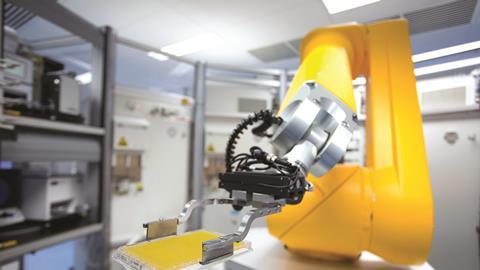The Pivot Park Screening Centre in Oss got off to a flying start thanks to an inheritance from America. The company is now the biggest screening facility in Europe. ‘Usually, only the biggest pharmaceutical companies have such robots at their disposal.’
The Pivot Park Screening Centre (PPSC) is the showpiece of Pivot Park in Oss. The company operates a robotic system for advanced high-throughput screening, testing up to 2,5 million compounds per run for their activity. ‘Visitors from big pharmaceutical companies are blown away when they see this’, says Chief Technology Officer (CTO) and PPSC founder Steven van Helden. ‘Our service is incredibly important to them. Drug development always starts with a lead compound. That is what we deliver.’
From 1 million to 50
Companies approach the PPSC with the protein for which they aim to develop an active molecule. ‘Sometimes they already have an assay; sometimes could design one for them’, says Van Helden. ‘The next step is automating the assays. Our robot has to work 24 hours a day and that process needs to be streamlined.’
In the pilot screening phase, 20,000 to 50,000 substances are screened in order to validate the automated process. ‘If this is successful, we run all the compounds that the client wants us to test – sometimes more than a million. Usually this yields between 1,000 and 3,000 possible hits.’
These still need to be confirmed through retesting. This so-called cherry picking is performed by a partner in Scotland. Subsequently, in the triage phase, the confirmed hits are characterized. ‘Assay techniques sometimes yield artifacts, or false positives. This happens for instance if a molecule is fluorescent to begin with and is wrongly identified as a hit in a fluorescence assay. We filter out these false hits by performing extra assays, of another type.’
‘Larger companies are blown away when they see this’
Eventually, only about 50 candidates, or qualified hits, remain. ‘These are all the molecules that we think interact with the customer’s protein. These are the starting point for further development.’
The PPSC has its own compound library available for the customer’s assays. ‘The molecules need to be ‘drug-like’, says Van Helden. ‘They may be of low molecular weight, for instance, and dissolvable. Our library contains about 300,000 substances.’
Bigger companies may bring their own compound libraries, which may contain over a million molecules. They may also use the libraries of the European Lead Factory (ELF). The ELF is a consortium that stimulates drug development in Europe. Interestingly, some pharma companies have shared their compound libraries with the ELF collection. ‘The PPSC has been named as the central screening facility for the ELF in Europe’, says Van Helden. ‘In that capacity we have already performed more than one hundred screenings for academic institutions and startups. There are even some success stories, including new antibiotics that are entering the clinic.’
Robot from the USA
That success has not been plucked out of thin air. The PPSC has a fascinating history. ‘It began with Organon, which implemented high-throughput screening in the mid-90s, testing 200,000 compounds per run’, explains Van Helden, who worked at Organon at that time. ‘In 2005 Organon was acquired by the American company Schering Plough. In true American fashion, Schering Plough wanted everything to be ‘bigger and better’. My team was tasked with developing a robotic system that could screen up to 2,5 million compounds per run. The machine was just about finished, when the company was sold to MSD.’
‘I immediately thought of that fantastic robot’
MSD had other plans and decided to close all research facilities in Europe. This was controversial, but it also offered an opportunity. ‘All the equipment was passed onto the newly established Pivot Park’, explains Van Helden. ‘I immediately thought of that fantastic robot still waiting in boxes in the USA. Luckily we got that machine and the PPSC was founded around it in 2012. This special history got us off to a flying start.’
That flying start now makes the screening facility – led by Brigitte Drees, see also the interview at page 10 – the pride of Pivot Park. Other companies on the site are also reaping the benefits of this, thinks Van Helden. ‘We organize events that attract potential clients, and we can also refer them to our neighbours. And last but not least, we also have an open-access lab, where others can work with our advanced equipment. I think this makes us a true asset to the park.’
The Pivot Park Screening Centre in figures:
- 50.4 million compounds screened
- 50 assays per year
- 18 screens per year
- 24 hit-to-lead programmes finalized and 10 running in 2022
















Nog geen opmerkingen